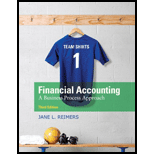
Financial Accounting
3rd Edition
ISBN: 9780133791129
Author: Jane L. Reimers
Publisher: Pearson Higher Ed
expand_more
expand_more
format_list_bulleted
Textbook Question
Chapter 7A, Problem 1SEA
Present value. (LO 8). Suppose you want to have $5,000 saved at the end of five years. The bank will pay 2% interest on your money. How much would you have to deposit today to have the $5,000 you want at the end of five years?
Expert Solution & Answer
Want to see the full answer?
Check out a sample textbook solution
Students have asked these similar questions
Hello tutor solve this question and accounting question
I need assistance with this general accounting question using appropriate principles.
I want the correct answer and accounting question
Chapter 7A Solutions
Financial Accounting
Ch. 7A - Prob. 1YTCh. 7A - Suppose Action Company issues a 1,000, 10-year,...Ch. 7A - Suppose HPS Company issues a 1,000 face value,...Ch. 7A - Present value. (LO 8). Suppose you want to have...Ch. 7A - Present value. (LO 8). Able Company has offered to...Ch. 7A - Calculate payments using time value of money...Ch. 7A - Calculate payments using time value of money...Ch. 7A - Prob. 5PACh. 7A - Prob. 6PB
Knowledge Booster
Learn more about
Need a deep-dive on the concept behind this application? Look no further. Learn more about this topic, accounting and related others by exploring similar questions and additional content below.Similar questions
arrow_back_ios
SEE MORE QUESTIONS
arrow_forward_ios
Recommended textbooks for you
- Principles of Accounting Volume 2AccountingISBN:9781947172609Author:OpenStaxPublisher:OpenStax College


Principles of Accounting Volume 2
Accounting
ISBN:9781947172609
Author:OpenStax
Publisher:OpenStax College


5 Steps to Setting Achievable Financial Goals | Brian Tracy; Author: Brian Tracy;https://www.youtube.com/watch?v=aXDuLxEJqBo;License: Standard Youtube License